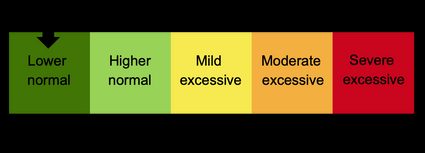Pediatric Epworth Sleepiness Scale Calculator
The pediatric Epworth sleepiness scale calculator allows you to screen for excessive daily sleepiness and possible sleep disorders.
The pediatric scale can be used both in children and adolescents. The results have a high correlation especially to academic achievement in school. 🧒
Read on to fully discover the potential of the pediatric Epworth score, its applications and necessary calculations.
We try our best to make our Omni Calculators as precise and reliable as possible. However, this tool can never replace a professional doctor's assessment. If any health condition bothers you, consult a physician.
What is the pediatric Epworth sleepiness scale?
ESS-CHAD is a medical abbreviation for Epworth Sleepiness Scale for Children and Adolescents. This tool is a straightforward method to assess how easy does your child fall asleep and whether this behavior is still within normal range. 😴
contains 8 easy questions describing everyday situations typical for the child's way of life – they serve as a screening test that helps us choose patients that may need further tests and specific treatment.
The pediatric Epworth score can detect not only harmful nighttime habits and bad sleep hygiene – it's one of the tools essential in the diagnosis of severe conditions, such as narcolepsy.
💡 Don't forget to take a look at the Epworth sleepiness scale calculator meant for adults.
The modified Epworth sleepiness scale in pediatrics contains different questions than its adult version – as everyone can image, we can't ask a child about drinking alcohol or driving a vehicle.
Which diseases may worsen the ESS-CHAD score?
Our pediatric Epworth sleepiness scale calculator will tell you both the numerical ESS-CHAD score and its description – the higher the score, the worse the result.
Let's quickly enumerate some of the diseases that may lead to an abnormal daily sleepiness and bad ESS evaluation:
-
Sleep apnea – the child stops breathing for a while during the course of a sleep. This may be caused by either the nervous system, e.g., the brain, or the excessive fat tissue. Fatter children tend to suffer from sleep apnea more often – this may lead to complications such as blood hypertension. Want to know more? Try the AHI calculator and the STOP BANG calculator.
-
Diabetes, which may also cause excessive drinking and dehydration. (see: the diabetes risk calculator)
-
Depression may cause trouble sleeping, and the changes in the day-night sleep pattern. Depression is often overlooked in children!
-
Asthma – a disease causing troubles in breathing, wheezing on exhale, up to severe shortness of breath.
-
, a complicated neurological disease that causes sudden falls, excessive sleepiness and hallucinations.
How to calculate the pediatric Epworth sleepiness scale?
Pediatric Epworth sleepiness scale scoring can take values from 0 to 24. The answer to each of the eight questions is worth 0, 1, 2, or 3 points.
What are the chances of you dozing/falling asleep when...
- You're sitting and reading? 📚
- You're watching TV or a video? 📺
- You're sitting in a classroom in a school in the morning? 🏫
- You're a passenger sitting in a bus or a car for half an hour? 🚌
- You're lying down to rest or take a nap in the afternoon, in comfortable conditions? 🛋️
- You're sitting and talking to someone? 🗣️
- You're sitting quietly alone after lunch? 🍕
- You're sitting an eating a meal? 🍜
Possible answers: | |
|---|---|
I never do it | 0 points |
Slight chance (it rarely happens) | 1 point |
Moderate chance (it sometimes happens) | 2 points |
High chance (it happens very frequently) | 3 points |
The last step is to count up all the points gained from all the answers. Our pediatric Epworth sleepiness scale calculator uses the following equation:
Pediatric Epworth sleepiness score = Reading + Watching + Classroom + Bus/car passenger + Lying down + Talking + After lunch + Eating
